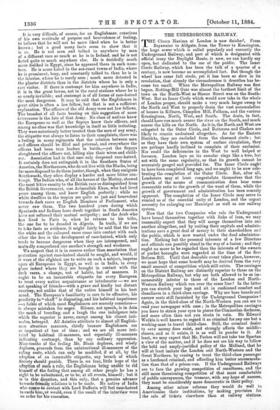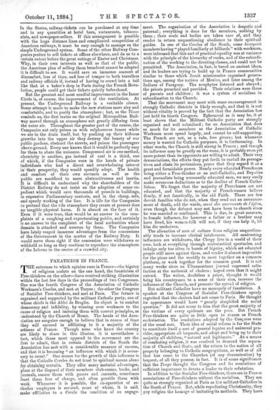THE UNDERGROUND RAILWAY. T HE Cloaca Maxima of London is now
finishee. From Bayswater to Aldgate, from the Tower to Kensington, the huge sewer which is called popularly and correctly the Underground Railway, and part of which is designated with official irony the Daylight Route, is now, we can hardly say open but dedicated to the use of the public. The Inner Circle Railway, which has been the talk of a quarter of a century, is now become an accomplished fact. But though the wheel has come full circle, yet it has been so slow in its revolution, that already the circumference it describes has be- come too small. When the Metropolitan Railway was first begun, Notting-Hill Gate was almost the furthest limit of the town on the North-West as Sloane Street was on the South- West. But an Inner Circle which would now take in the whole of London proper, should make a very much larger sweep to the North and West to properly drain the vast accumulation of houses in Kilburn, Campden Hill, Fulham, and the various Kensingtons, North, West, and South. The drain, in fact, should have run much nearer the river on the South, and much nearer the hills on the North. As it is, the North and West are relegated to the Outer Circle, and Battersea and Chelsea are likely to remain undrained altogether. As for the Eastern Districts' they are excluded from the charmed circle ; but as they have their own system of surface circulation, they are perhaps hardly inclined to complain of their exclusion. Nor could the deficiencies in the West be well helped or foreseen. London lays on its annular rings like a tree, but not with the same regularity, so that its growth cannot be accurately gauged and provided for. The Inner Circle ought to have been completed long ago, and we ought to be now cele- brating the completion of the Outer Circle. But, after all, Londoners may at least congratulate themselves that the growth of the means of communication does bear some reasonable ratio to the growth of the want of them, while the growth of government and administration has been scarcely apparent. The completion of the Inner Circle may serve to remind us of the essential unity of London, and the urgent necessity for enlarging our Municipal as well as our railway system.
Now that the two Companies who rule the Underground have bound themselves together with links of iron, we may reasonably expect that they will merge themselves into one another altogether, and by uniting their capitals and adminis- trations save a great deal of money to their shareholders and the public, which is now wasted under the dual administra- tion. Nothing but the personal interests of a few Directors and officials can possibly stand in the way of a fusion ; and they ought no more to be regarded than the interests of the owners of pocket boroughs were regarded at the time of the first Reform Bill. Until that desirable event takes place, however, we must hope that some benefit may be derived from the very small amount of competition which still exists. The carriages on the District Railway are distinctly superior to those on the Metropolitan Railway, but why are both allowed to be so im- measurably inferior to those of the London and North- Western Railway which ran over the same line ? In the latter you can stretch your legs and sit in cushioned comfort and cleanliness in a third-class carriage. Why are bare boards and narrow seats still furnished by the Underground Companies ?
Again, in the third-class of the North-Western you can see to read your newspaper with ease ; in the Metropolitan carriages you have to strain your eyes to pierce the Cimmerian darkness, and more often than not you strain in vain. Sir Edward Watkin is well known to regard it as criminal for any one but a working-man to travel third-class. Still, the criminal desire to save money does exist, and strongly affects the middle- classes, and as it exists, it is as well to pander to it. At least, we may expect that Mr. Forbes will not take too Spartan a view of the matter, and if he does not see his way to follow the bold and amply-justified policy of the Midland, that he will at least imitate the London and North-Western and the Great Northern, by ceasing to treat the third-class passenger as a hardened criminal, and affording him better accommoda- tion than that of a prison-van. If the Underground Railways are to face the growing competition of omnibuses, and the still more threatening competition of that most comfortable of public conveyances, the tramcar, with any hope of success, they must be considerably more democratic in their policy.
Among other minor reforms they would do well to Americanise their institutions, by making provision for the sale of tickets elsewhere than at railway stations. In the States, railway-tickets can be purchased at any time and in any quantities at hotel bare, restaurants, tobacco- nists, and newspaper-sellers. If this arrangement is possible with the huge distance lines and complicated competition of American railways, it must be easy enough to manage on the simple Underground system. Some of the other Railway Com- panies profess to sell tickets at offices elsewhere, and do so to a certain extent before the great outings of Easter and Christmas. Why, in their own interests as well as that of the public, the American plan of selling them broadcast cannot be adopted it is difficult to see. It would save an immense amount of discomfort, loss of time, and loss of temper to both travellers and railway officials if, instead of having to crowd into a tail like that at a baker's shop in Paris during the French Revo- lution, people could get their tickets quietly beforehand. But the greatest and most needful improvement in the Inner Circle is, of course, the improvement of the ventilation. At present, the Underground Railway is a veritable cloaca. Some attempt is made to make the new stations more airy and comfortable, and to purify the atmosphere ; but, as the Times reminds us, the first trains on the original Metropolitan Rail- way moved through an atmosphere not greatly differing from the outer air. Throughout the greater part of the course, the Companies not only poison us with sulphureous fumes while we are in the drain itself, but by pushing up their hideous growths into the upper air they destroy the beauty of our public gardens, obstruct the streets, and poison the passengers above-ground. Every one knows that it would be perfectly easy for them to abate the nuisance. Compressed air is one method, electricity is another, gas instead of coal is a third, one of which, if the Companies were in the hands of private individuals who had a direct and overwhelming interest their prosperity, they would speedily adopt. The health and comfort of their own servants as well as the public are sacrificed to mere obstructiveness and inertia. It is difficult to understand why the shareholders of the District Railway do not insist on the adoption of some ex- pedient which would save thousands of pounds in buildings, in expensive Parliamentary contests, and in the cheap, safe, and speedy working of the line. It is idle for the Companies to pretend that the vile atmosphere they create at present does no tangible physical harm. It is absurd on the face of it. Even if it were true, that would be no answer to the com- plaints of a coughing and expectorating public, and certainly is no answer to the complaint of the local authorities whose domain is attacked and overrun by them. The Companies have lately reaped immense advantages from the concessions of the Government in the matter of the Railway Duty. It would serve them right if the concession were withdrawn or withheld as long as they continue to reproduce the atmosphere of the Inferno in the centre of a crowded city.



































 Previous page
Previous page